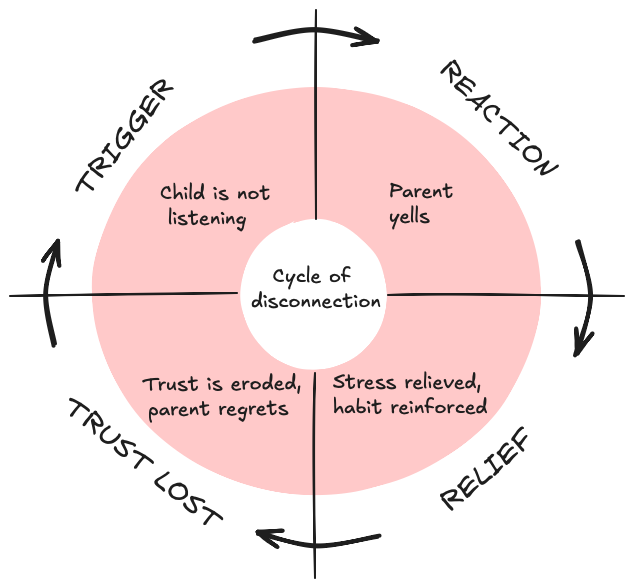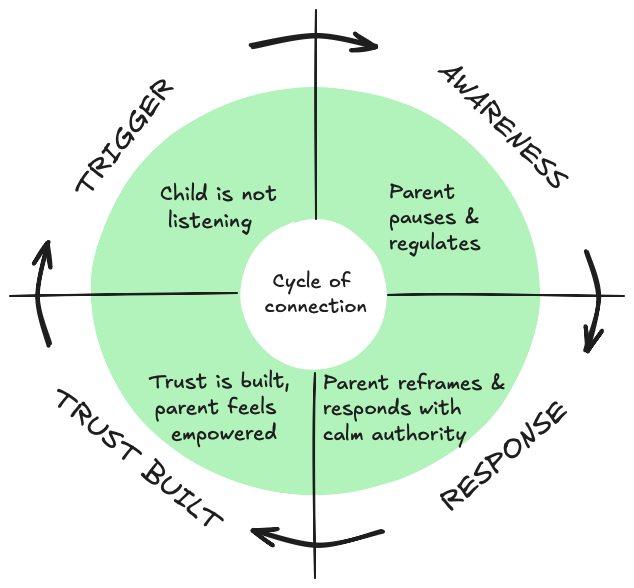Why We Yell at Our Children
Yelling at our children is something many parents do—often in moments of frustration, stress, or helplessness. In fact, studies show that up to 90% of parents admit to yelling at their kids at some point.1 While it may feel like a quick release or a way to get attention, research consistently shows that yelling can harm a child's emotional well-being, increase anxiety, and damage the trust and connection between parent and child. It also leaves parents feeling guilty and ineffective, ultimately undermining the very relationship they want to nurture.
Why Yelling Happens
Yelling is not a personal failure — it's a habit. Often triggered by stress, fatigue, or emotional overload, yelling is a learned reaction that many parents fall into. In fact, most parents who yell were likely yelled at themselves as children. This pattern becomes ingrained over time, passed from one generation to the next—not out of malice, but because it's what feels familiar in moments of frustration.

Dangers of Yelling at Children
Yelling at children may seem like a quick way to get their attention, but it can cause lasting harm to their emotional well-being and the parent-child bond. Research shows that harsh verbal discipline—including yelling, shaming, or name-calling—can increase a child's risk of developing anxiety, depression, and behavioral problems1. It can also erode their self-esteem and sense of safety, leading to fear-based compliance rather than genuine understanding2. Over time, frequent yelling damages trust and connection, making children less likely to confide in their parents or respond positively to guidance3. While it may be unintentional, this cycle often leads to more conflict and disconnection at home.
Harm to the Child
- Emotional distress: Increases risk of anxiety, depression, and emotional insecurity.
- Behavioral issues: Linked to aggression, defiance, and long-term conduct problems.
- Low self-esteem: Undermines a child's sense of worth and safety.
- Fear-based compliance: Children obey out of fear, not understanding or respect.
- Normalizes verbal aggression: Teaches children to use yelling as a coping or communication tool.
Harm to the Parent
- Reduced influence: Yelling weakens a parent's ability to guide and teach effectively over time.
- Increased frustration: Often leads to a cycle of escalating conflict and emotional burnout.
Harm to the Parent-Child Relationship
- Erodes trust: Children become less likely to open up or seek support.
- Weakens emotional connection: Repeated yelling fosters distance instead of closeness.
- Creates a tense home environment: Makes interactions more reactive and less nurturing.
Solution: Break the Cycle
The good news is that, like any habit, it can be unlearned and replaced with more constructive ways of responding. Even Keel Parenting app helps you break that cycle with awareness, support, and practical tools. Instead of reacting with frustration, you can learn to respond with calm. This parenting app guides you in building a new habit — one based on connection and regulation rather than yelling.

Key Elements to Breaking the Cycle
Awareness
Notice when and why you yell. Recognizing your triggers is the first step toward change.
Pause the Pattern
Use a tool (like the app's Pause Button) to interrupt the automatic reaction before it happens.
Replace with Calm
Choose a new response — such as taking a deep breath, grounding yourself in the moment and responding with calm authority.
Practice Daily
Small, consistent actions over time create real, lasting change. Use reminders to keep your goal front of mind.
Track Progress
Seeing your growth helps build motivation. Even small wins count — like catching yourself mid-pattern.
Be Kind to Yourself
Change is hard. You don't need to be perfect — just committed to trying again.
With patience and practice, you can build a new pattern — one that brings more peace to you and your child.
Ready to Start Your Journey?
Download the app and begin breaking the yelling cycle today.